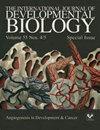Unceasingly searching for answers - an interview with Claudio Stern.
IF 1.3
4区 生物学
Q4 DEVELOPMENTAL BIOLOGY
引用次数: 0
Abstract
Claudio Stern was born in Montevideo, Uruguay where he received his school education. He moved to the United Kingdom at age 18. This interview briefly explores his trajectory from Uruguay, through universities in the UK (Sussex, UCL, Cambridge and Oxford) and USA (Columbia) and how he was influenced by various mentors and experiences.
不断寻找答案——对克劳迪奥·斯特恩的采访。
克劳迪奥·斯特恩出生于乌拉圭的蒙得维的亚,并在那里接受了学校教育。他在18岁时移居英国。这次采访简要探讨了他从乌拉圭到英国(苏塞克斯、伦敦大学学院、剑桥和牛津)和美国(哥伦比亚)大学的发展轨迹,以及他如何受到各种导师和经历的影响。
本文章由计算机程序翻译,如有差异,请以英文原文为准。
求助全文
约1分钟内获得全文
求助全文
来源期刊
CiteScore
1.90
自引率
0.00%
发文量
16
审稿时长
2 months
期刊介绍:
The International Journal of Developmental Biology (ISSN: 0214-
6282) is an independent, not for profit scholarly journal, published by
scientists, for scientists. The journal publishes papers which throw
light on our understanding of animal and plant developmental mechanisms in health and disease and, in particular, research which elucidates the developmental principles underlying stem cell properties
and cancer. Technical, historical or theoretical approaches also fall
within the scope of the journal. Criteria for acceptance include scientific excellence, novelty and quality of presentation of data and illustrations. Advantages of publishing in the journal include: rapid
publication; free unlimited color reproduction; no page charges; free
publication of online supplementary material; free publication of audio
files (MP3 type); one-to-one personalized attention at all stages
during the editorial process. An easy online submission facility and an
open online access option, by means of which papers can be published without any access restrictions. In keeping with its mission, the
journal offers free online subscriptions to academic institutions in
developing countries.

 求助内容:
求助内容: 应助结果提醒方式:
应助结果提醒方式:


